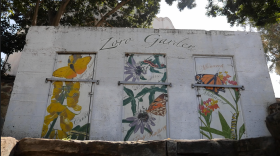Mexican voters will go to the polls to elect a new president on July 1, and the recent drug violence that has caused more than 50,000 deaths is a big issue on voters' minds.
One Texas border artist brings the scenes of this war — and the pain that accompanies it — to life.
Rigoberto Gonzalez was born in Reynosa, Mexico, just across the border from McAllen, Texas. He now lives 35 miles to the east in Harlingen, Texas, where he teaches art and paints out of a small studio on a busy street.
Gonzalez considers himself a figurative painter. He’s deeply influenced by the dramatic stories and moody lighting of Renaissance and Baroque painters.
Lately, he’s taken that style and applied it to scenes from the border — particularly Mexico’s bloody drug war.
His first piece on the subject was a life-sized severed head, which he started working on in 2007.
“That’s when it started appearing on the news: throwing severed heads in bars,” Gonzalez said. “And because of my interest in Baroque art, I couldn’t help but connect it with paintings of, you know, like John the Baptist, and the head of Goliath.”
Gonzalez said he gets his inspiration from stories he hears on the news or reads in newspapers, and from stories people tell him about their own experiences living along the border.
Some local museums and galleries have been reluctant to show his work because they consider it too negative, Gonzalez said. But he’s drawn to the dark drama.
“For some reason I’ve always had this interest in doing things that are terrible and beautiful,” Gonzalez said.
“It does give me angst, but I think that’s what great art really should inspire.”
The artist said he hoped his work had “a sort of cathartic quality to it” and could start a healing process.
“You can’t keep suppressing and not wanting to talk about it,” Gonzalez said. “You show the work, it engages the public, starts a discussion, starts a dialogue. So that, in a way, is really what my work’s about: starting a dialogue.”
“And one thing that really strikes me is when you see the men when they’re captured, the heads of the cartels and the hit men, and I look at them, and I’m like, ‘that looks like my cousin’ or ‘it looks like my brother,’ you know? That could be me.”
The similarity scares him, he said.
Gonzalez’s work isn’t solely focused on violence. Currently he’s working on a vivid depiction of a river crossing by migrants in Ciudad Juárez.
“There’s an incredible amount of dramatic quality to the stories of people living” along the border, he said.
“There’s an incredible love of family. People risking their lives to better care for their families.”
The dramatic stories of people living along the border produce a lot of sound bites, Gonzalez said.
“As an artist I’m trying to do my part to expand upon those sound bites.”








